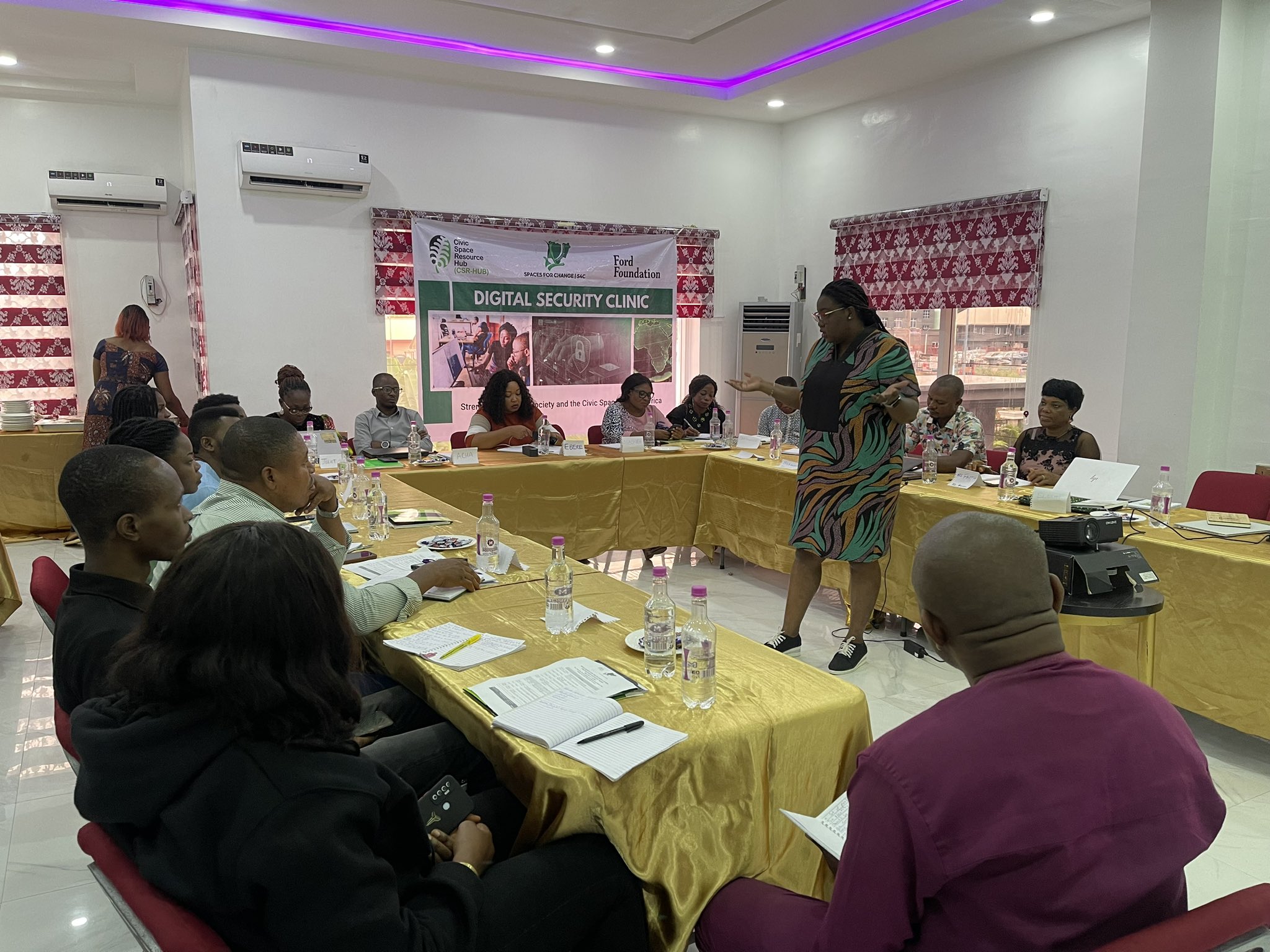Owing to threats by cyber space criminals, journalists and civil society organisations are being educated on how to handle such. OKECHUKWU ONUEGBU reports.
The security of lives and property is very paramount and should be the outmost concern of every citizen, including the government. It is therefore a human right. This juxtapose the fact that economic activities, sociopolitical and religious lives hardly thrive in an atmosphere of war, chaos, unhealthy rivalry and total breakdown of law and order.
Why secure cyber space?
Available records has shown that when people are secured or free from danger, threats and other illegalities, they tend to be more productive and joyous. This probably underscores the reason every serious government and individual budget more in securing their lives and means of livelihood.
Perhaps, this spurred the Spaces for Change (S4C), a non-profit organisation working to infuse human rights into social and economic governance processes in Nigeria to organise a two- two-day digital security clinic for journalists and civil society organisations in the South-east.
S4C, which co-leads Civic Space Resource Hub (CSR-HUB) with West Africa Civil Society Institute (WACSI), held the event at Owerri, Imo state capital with support from Ford Foundation.
The digital clinic was aimed at addressing the evolving digital threats faced by media and civil society organisations (CSOs) with a view to equipping the participants with essential knowledge and skills to mitigate these risks effectively. The programme was necessary considering the facts that the media and civil society organisations expose corruption, crimes and criminalities while engaging with the public through information gathering and dissemination and activism.
Background
To appear genuine and impartial while engaging in this onerous tasks, media practitioners and CSOs, like other citizens, divulge their identities more on the digital space by supplying their data, in addition to those already supplied to the government and other relevant institutions voluntarily.
In Nigeria, data usually volunteers include name, organisation, house number, birthday, addresses, emails, phone numbers, marital status and others. Social media sites collate data to register users, telecommunications do that to simcards seekers, while Independent National Electoral Commission (INEC) and National Identity Management Commission (NIMC) do same to issue voters cards and NIN (National ID cards) respectively. Others are the immigration, hospitals, websites, schools, religious groups, transporters, associations, commercial and loan banks, to mention a few.
All these data are prone to be hacked into using Internet malware, pissing and related virus to defraud owners by professional hackers and other criminal elements whenever they succeed in gaining access to them either through the portals of the institutions housing them or through the applicants (owners). The government through the law enforcement agents could equally utilise them in tracking, tracing, arresting or torturing genuine media practitioners and activists under the disguise of enforcing repressive legislations (laws and acts). This entails why the citizens kicked when the government slammed indefinite suspension on Twitter in Nigeria, including during introductions and proposed amendments aimed at criminalising information sharing such as the Social Media Bill, the Hate Speech Bill, the Nigerian Press Council (NPC) Act and the National Broadcasting Commission Act.
Lecturers took their turns
The executive director, Spaces for Change (S4C), Ms Victoria Ibezim-Ohaeri, who declared the event open averred that it was aimed at bringing people from different sectors together with a view to brainstorming and be enriched with the knowledge of how to stay safe online or securing the online as their digital home.
Ibezim-Ohaeri, while speaking on social protection and rapid responses, noted that Nigerian Constitution guarantees the right to personal privacy, prohibits unlawful intrusion in citizens homes, correspondences, phone calls and communication.
She, however, enumerated some repression been faced by civil society members and the media in digital space to include, labelling, surveillance, producing and cyber bullying, even as she proffered some protection mechanisms to overcome the challenges such as formal mechanisms, informal mechanisms, institutionalised and solidarity, adding that they should identify with the legal aid, professionals, National Human Rights Commission and others for assistance, guidance and resources to scale through in the event of danger.
Also speaking, Dr Amanim Akpabio of the University of Uyo in Akwa Ibom state disclosed that every citizen, including journalists and CSOs have digital rights because it is also a human right. He said what is often regard as rights are subjected to meanings, definitions and theories.
“When we talk about rights, we are talking about human beings. I go by the definition of Stephen P. Marks which says that human rights constitute a set of norms governing the treatment of individuals and groups by states and non-state actors in the basis of ethical principles regarding what society considers fundamental to a decent life,” Akpabio maintained.
He argued further that there would be a problem when the government has to dictate to persons only what they want to consider as rights as against the main one inherent in the person since everyone has some inherent rights.
“It is universal; it applies to all humans. That is, what is considered as rights in US should equally be considered as rights in Nigeria. It is inalienable; it must not be taken away from anyone. It is indivisible; everyone is entitled to the full package of human rights without discriminations,” he noted.
Another speaker, Ms Adenike Aloba opined that, “The media, journalists and civil society groups are the most vulnerable actors to digital threats and attacks. Although women and gender rights activists are far more likely to face cyber bullying online than men operating in the same space.”
Adenike, therefore, enjoined the participants to be mindful of the data they divulge online or click on, adding that they should equally master the use of safety tools like incognito for data security while downloading some documents in data vulnerability, avoid indiscriminate answering or making calls, plugging or connecting phones to charges.
She also urged participants to separate their personal profile pages and email on social media from those they use for businesses or works, as well as to use alphanumeric characters for passwords.
Speaking on the digital rights in West Africa, Mr Adegoke Adeboye, described digital rights as human rights in digital space, which are equally guaranteed by Nigeria’s constitution, African charter and other relevant legislations.
According to Adeboye, the same rights people enjoy offline must also be enjoyed online and everyone, including the journalists, the accused, criminals, law enforcement officers, judges, public officials and others, he said, are entitled to their rights and safety in the digital space.
Contributing, the communication officer, Spaces for Changes, Ms Sefa Ikpa, explained that S4C and partners launched CSR-HUB with support from Ford Foundation to empower CSOs in West Africa to ward off government restrictions and targeted attacks by attaining significant improvements in regulatory compliance, regulatory compliance clinics, among others like civic space vigilance through the closing spaces database document data for mapping, documentation, research, data analysis, and advocacy.
“The CSR-Hub is a resource centre designed to strengthen capacities of civic actors and civil society organisations in West Africa to effectively respond to emerging and long standing challenges to the civic space in the sub region, in order to enable them deliver on their development objectives. The idea is to ensure resilience of civil society organisations.
“This aims to empower CSOs in West Africa to ward off government restrictions and targeted attacks by attaining significant improved regulatory compliance, regulatory compliance clinics, to help them know what to do and how to do it to be free from threats. It is also a research and knowledge building, with a focus on building capacity of CSOs, the media and grassroot,” she added.
She urged participants to develop and activate a digital security policy in their respective organisations, as well as to utilise some safety tools- encryption for secure storage of data and conversations on the Internet, such as PCloud, leedrive, Telegram, Tresorit, Google Drive, We transfer, protonypn.com, and librewolf.net.
On his part, another speaker and legal officer, S4C, Mr Patrick Allam, tasked the participants on deepening their knowledge of whistleblowing policy in order to understand and differentiate between whistleblowing, a snitch, criminal, opportunist and spies.
Allam also stressed the needs for provisions of coverage to whistleblowers in the digital space such as shielding their identities, including to ensure that the proposal of whistleblowing burden should be on the person accused not the person that released the information.
Earlier, Professor Paul Nwulu, a strategic communication expert, advocated for adoption of storytelling approach by NGOs/media to drive their stories and experiences.
“The approach include oral storytelling, visual storytelling online, written storytelling, and digital storytelling. You can also use podcast and radio to reach millions of people. Tools for online written storytelling are mailchimo, HubSpot, zobo campaigns, benchmark.”
For photo tips he said, “Get a photo camera. Ask questions, consider the background, angle that helps, avoid redundant photos, capture the candid, caption, and edit brand. For film and video, keep the video to look professional. The shorter the better. Show motions and honest moments,” he noted.




